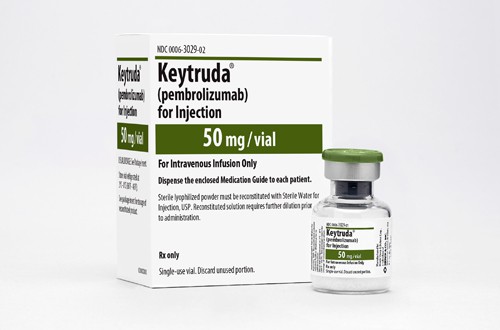
Merck & Co’s immuno-oncology blockbuster Keytruda has become the first drug in its class to be approved in China for advanced melanoma.
It’s not the first PD-1 inhibitor to get a green light in China, however, as Bristol-Myers Squibb pipped it to the post when it won approval for Opdivo (nivolumab) in the much-larger non-small cell lung cancer (NSCLC) indication last month. Nevertheless, it gives Merck an opportunity to start rolling out its drug in the world’s second largest pharma market while it prepares for approval of Keytruda (pembrolizumab) for NSCLC and other indications.
The approval by the China National Drug Administration (CNDA) is for adults with unresectable or metastatic melanoma following failure of one prior line of therapy, and ends a drought in effective new therapies for the skin cancer in China that extends back decades, according to Professor Jun Guo of Peking University Cancer Hospital.
“With the approval of pembrolizumab in China, the treatment of advanced melanoma will now be aligned with international standards,” he said.
China’s pharma market was worth $140bn last year, according to BMI Research, and is predicted to rise 15% to almost $170bn this year thanks to its large and expanding population, the increasing burden of chronic diseases and the ongoing reforms shaping the country’s medicine market, including a push for improve healthcare access.
The size of the market has made it a big target for many big pharma companies, but in cancer immunotherapy the roll-out of new therapies in China has been slow – occurring four years after Opdivo and Keytruda first made their debuts in the West. And with headlines trumpeting the successes of the first generation of checkpoint inhibitors in multiple cancers, there is pent-up demand for the drugs among Chinese patients and oncologists.
Keytruda’s approval is on the back of the KEYNOTE-151 study, a phase 1b trial which tested the drug as a second-line monotherapy in Chinese patients and – thanks to a priority review from the CNDA – set an “industry-leading approval turnaround time for imported cancer medicine in China,” says Merck.
China’s pharma industry isn’t resting on its laurels, however, and Beijing company BeiGene said earlier this week it plans to file for approval of its PD-1 inhibitor tislelizumab for classical Hodgkin’s lymphoma before the end of 2018. It also has phase III trials ongoing in NSCLC and other solid tumours.
Meanwhile, Hengrui Medicine also has an anti-PD-1 drug in registration trials, and there are estimated to be upwards of 20 other homegrown checkpoint inhibitor drugs in earlier stages of clinical development.




